This past year, ChatGPT has become a major tour de force in the world of AI applications. While GPT is a massive step forward for several digital applications, it presents several possibilities in content production. This article will examine the possibilities and pitfalls of using it for writing, SEO, and general marketing applications.
Developed by OpenAI, the main draw of this new AI tool is the human-like interaction it provides along with its responsive design and ease of use. By entering a simple question you can talk to the GPT-3 system and it gives intuitive responses that draw from some unnamed sources and are generally correct (with many exceptions).
We examined the SEO applications as others see them and ran a few experiments to test the AI. Here are our findings:
ChatGPT & Future GPT AI Applications
A lot of marketing professionals are excited about the potential these new AI tools offer (we’ve covered other tools here). We’ve also seen them experimenting with SEO, creative content, images, web design, and so much more. ChatGPT is useful for some of these while lacking in others.
Here’s what we’ve learned from the current GPT-3 iteration (it gets better all the time, so keep in mind things may change):
- ChatGPT is great for written content drafts but SEO applications can vary. It creates cogent sentences but lacks in the analytical department because it isn’t linked to any analysis tools.
- It’s great for generating headlines but you’ll need to test them for SEO.
- It can be a great jumping-off point to brainstorm a few keywords that you can enter into SEMrush or Ahrefs, but the keywords are rarely optimal in terms of SEO.
- The AI answers questions with stunning grammatic accuracy (but not without pitfalls, fibs, and inaccuracies).
- The AI can write SEO-optimized content but it may not always understand the context that suits your needs.
- Another issue is that it may not be able to reasonably expand on the topic.
- The content it creates is often generic so only use it as a starting point (do not copy it as is).
- Creatively, GPT uses a lot of linguistic cliches that make the writing lacklustre.
- Similarly, when you talk to GPT 3, the answers it provides could be someone else’s intellectual property, so it’s worth checking for originality.
- It can be great for short meta descriptions or tweets as long as you provide keywords.
- The GPT AI is evolving rapidly and learning from previous inadequacies so answers may vary from day to day.
While OpenAI’s recent outing is a mixed bag for SEO, there are already planned improvements in future iterations. These could bring a number of possibilities like chatbot integrations, search engine capabilities, and much more. GPT-4 is already being planned, not to mention the rival AI we’re expecting from Google and other silicon valley giants.
ChatGPT & SEO
Here’s the part where the AI really lacks: it can’t do keyword research. We asked the program for a number of keywords related to AI tools and the output was not impressive. It generated a list of related words and phrases that were handy as a starting point, but the keyword performance on SEMrush was less than stellar.
It appears to have generated a list of related search terms regardless of their SEO:
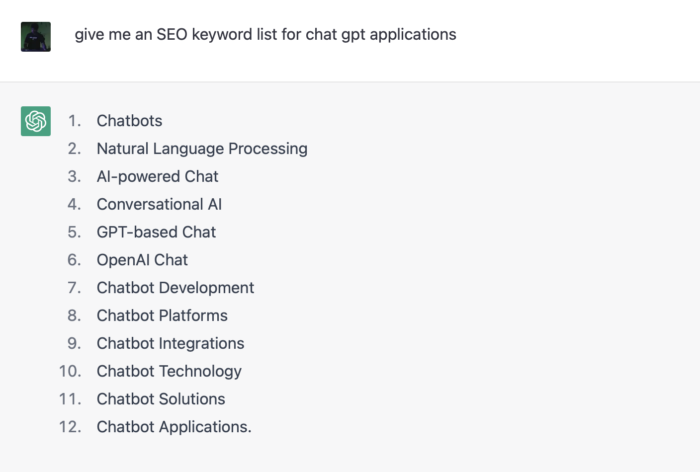
Upon further inspection with our own SEO tools, we found that this list was not optimal. They were all keywords saturated with high-performing competitor content and showing random volumes. In essence, it looked up the most commonly associated terms in a linguistic manner rather than accounting for search engine potential.
Furthermore, while the AI will give you a series of keywords if you ask it, once you inquire about high-ranking ones, it will tell you it can’t do that and recommend using SEMrush or Ahrefs:
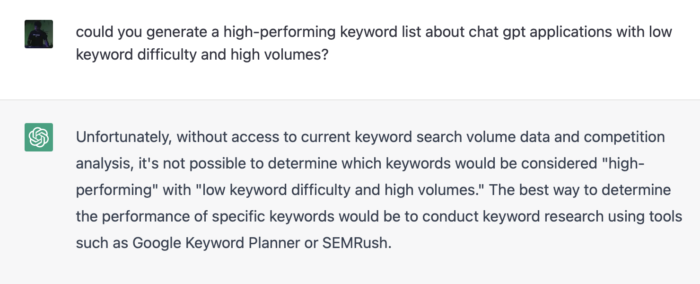
This is an area where it could improve in the future due to the machine learning algorithms but currently, you’re better off trying out dedicated SEO tools. You can supplement your ChatGPT work with SEO keywords or ask it to synthesise some high-ranking content for you but the ethics of that are still grey.
There’s no doubt that ChatGPT could randomly create SEO-optimised content since its main function is to scour its database and the internet for good content to use as an output. However, there might be some tweaking necessary from the AI side along with asking the right questions.
ChatGPT Content Applications
Since we’ve already covered the data side of things, let’s talk creative content. We ran a few tests to see how well ChatGPT can perform as a creative marketing tool. Here’s the output when we asked it to write a few slogans advertising itself:
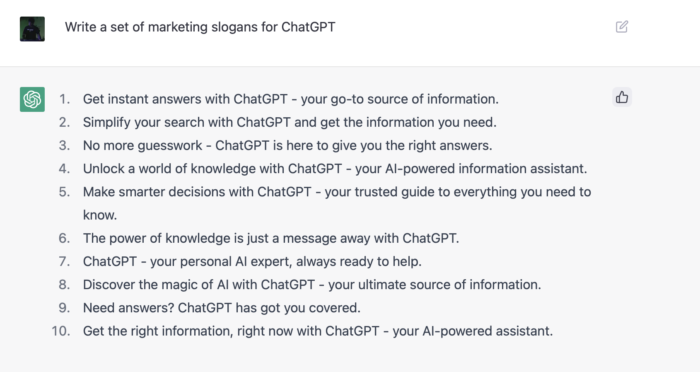
While not bad by any means, I personally feel that it lacks flavour and sounds like a salad of standard marketing cliches. “Discover magic” or “go-to source” are fine slogans at best. We also ran a few tests on other products. Here’s one for Coca-Cola:
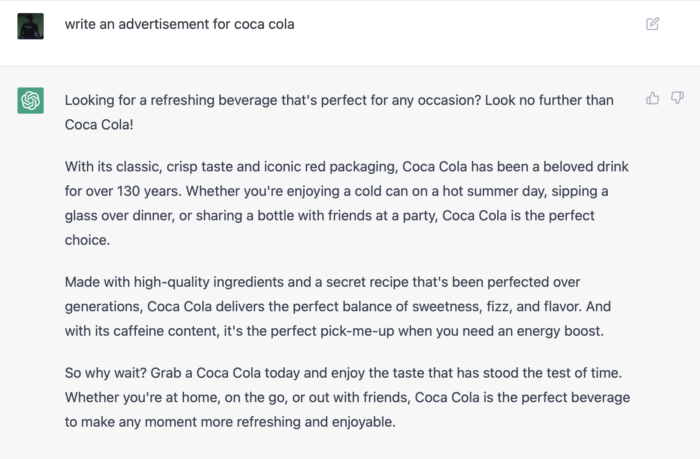
This one had me picturing ChatGPT putting on its best 1950s radio commercial voice and reading an ad brief.
Next, we asked it to write an ad for Pepsi and it wrote almost the same text:
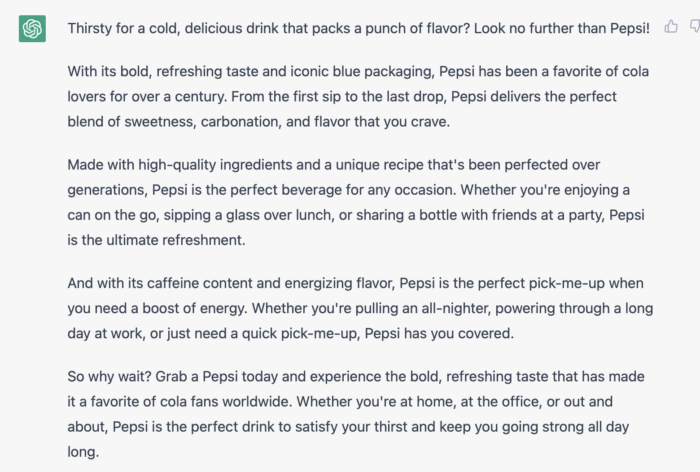
This indicated that GPT will write a generic copy for different brands in a similar category. Why is this important? It proves that you may need to fiddle with your prompt a bit if everyone is going to be using it to produce ad copy (otherwise your work will look similar to everyone else’s and you really don’t want to seem lazy or be accused of plagiarism).
The interesting part came when we told GPT to produce an emotional ad for Coca-Cola:
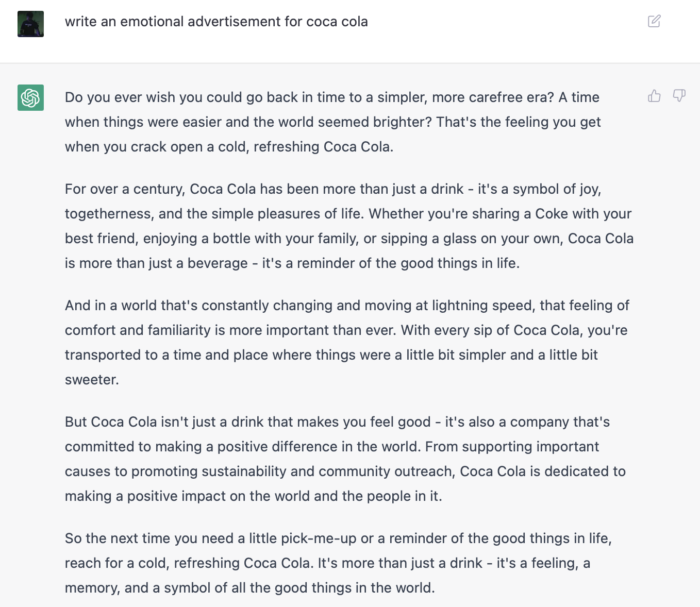
Not bad. This experiment also highlights that GPT’s internal info can ape Don Draper when it needs to and probably has stores of information that respond better to specific prompts. It was also probably fed with multiple styles of adverts and linguistic protocols that allow it to produce that.
Our verdict: useful for a first-draft copy if you feed the right prompts even if the output is generic.
The downside is, however, that it regurgitates a lot of the same copy and if your rivals are going to be using it as well, you might all end up with a similar-sounding copy. It’s also not as great at varying its tone as you’d like it to be, especially if your company if it has a quirky tone of voice. Perhaps later iterations will remedy this.
AI SEO Services
But fret not! There are other alternatives to the GPT-based systems that you can use for SEO content or use to double-check it and complement your AI content:
- NeuronWriter: this one offers an AI assistant for writing, competitor analysis, SEO comparisons, and a bunch more features. It’s great for content creation and intuitive SEO copywriting.
- Outranking: A good multilingual tool for generating content and having an AI assistant carry you most of the way. It’s fairly good at SEO content, keyword gaps, and SERP Analysis.
- SEMrush: While SEMrush may not have the writing capabilities of the others listed above, it can give you just about everything else and find you the ideal content for your keywords that makes the job much easier. It’s especially great for developing an SEO strategy.
Similarly, if you’re looking for bots to help with customer service or chatbot applications or customer management, there are substitutes that offer all sorts of integration. Some conversational AI examples include:
- SmartAction: a conversational ai solution for all sorts of customer experience purposes.
- SmartsUpp: this one offers chat, chatbots, and video recordings to help create a perfect solution for CX.
- IBM’s Watson Assistant: IBM’s customer care assistant is intuitive and easy to install. The company’s work is always reiterating and improving this handy tool.
If you’re looking for someone to help with your SEO, you may not need an AI! We provide SEO content services and so much more.


